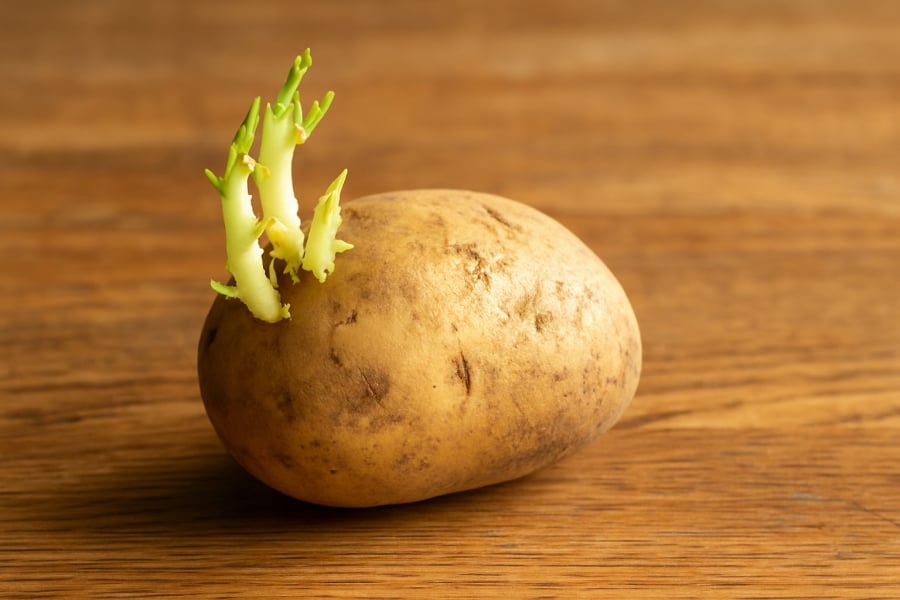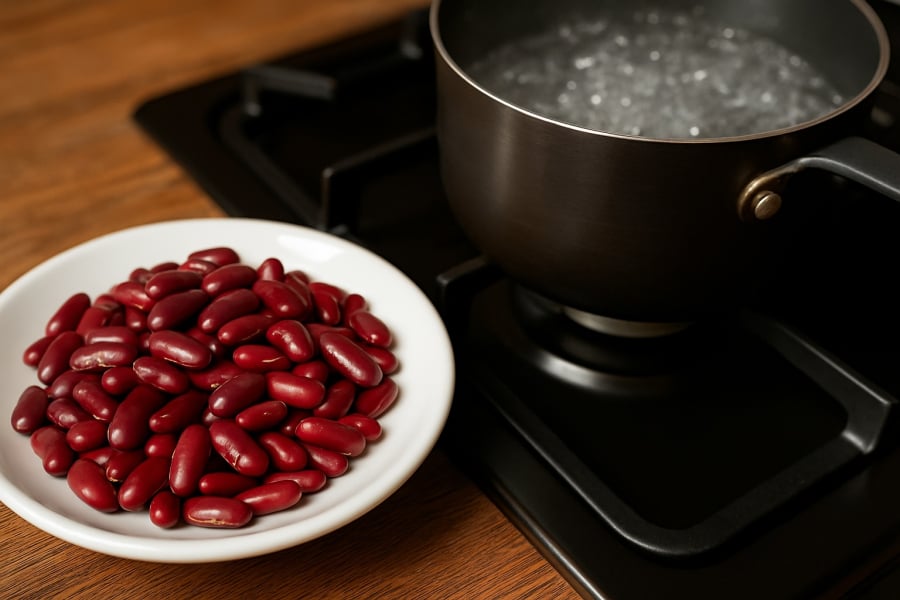Sprouted Potatoes – The Silent Killer in Your Pantry
Have you ever come across soft potatoes with green spots or sprouting ends and still used them for cooking? Many people think that simply cutting off the sprouted parts is enough, but the reality is not that simple.
When potatoes sprout, they produce solanine, an extremely toxic glycoalkaloid. Consuming even a small amount of solanine can cause symptoms such as abdominal pain, nausea, vomiting, diarrhea, and in severe cases, it can even affect the central nervous system and lead to death.
Sprouted or green potatoes usually contain solanine, a very dangerous natural toxin. Even thorough cooking does not destroy this toxin completely. Therefore, it is best to discard potatoes that have sprouted or show signs of greening to avoid food poisoning for your family.

Green Tomatoes – A Beauty to Behold, but a Danger to Consume
If you’ve ever tasted green tomatoes or used them for pickling, you should reconsider. Unripe tomatoes (still green) contain alkaloids, compounds that can be toxic, especially solanine, similar to sprouted potatoes.
Consuming large quantities of green tomatoes can cause nausea, vomiting, headaches, fatigue, and diarrhea. This is an experience that many have gone through without knowing the real cause.
Advice: Only use fully ripe, red tomatoes, avoiding green ones, especially when preparing food for children or the elderly with weak digestive systems.
Red Kidney Beans – Small but Mighty, a Stomach’s Worst Nightmare
Not many people know that red kidney beans, if not properly cooked, are one of the most toxic foods out there. This is because raw kidney beans contain high levels of lectin, a toxic protein that can cause nausea, vomiting, severe abdominal pain, and diarrhea just a few hours after consumption.
The danger lies in the misconception that simply soaking the beans or boiling them for a few minutes is enough. In reality, lectin is only destroyed when the beans are boiled at high temperatures for at least 10 minutes.
According to the Food Safety Authority (Ministry of Health), lectin, the natural toxin found in kidney beans, cannot be eliminated by simply soaking them in cold water or undercooking them. To ensure safety, beans should be soaked for at least 5 hours and then boiled for a minimum of 30 minutes.

Fresh Wood Ear Mushrooms – The Unexpected Culprit of Skin and Respiratory Irritation
Fresh wood ear mushrooms (fresh black fungus) are a familiar ingredient in many dishes, from stir-fries to soups and dumpling fillings. But what many don’t know is that fresh wood ear mushrooms contain porphyrin, a substance that causes photosensitivity, leading to skin inflammation, itching, and even laryngeal edema, resulting in breathing difficulties.
Mild cases may only involve skin allergies, but more severe reactions can include respiratory disorders, hypotension, and hospitalization.
Note: Do not consume wood ear mushrooms when they are fresh. Make sure to sun-dry, soak, and thoroughly cook them before use.
Star Fruit – Golden for the Healthy, Poisonous for Those with Kidney Problems
Star fruit is rich in vitamin C and has a refreshing taste, often used in rustic dishes. However, for those with kidney problems, especially kidney failure or those on dialysis, star fruit can turn into poison.
Star fruit contains caramboxin, a neurotoxin that cannot be excreted by weak kidneys. When kidney patients consume star fruit, the toxin accumulates in the body, leading to symptoms such as prolonged hiccups, confusion, seizures, and even death.
Doctor CKII Nguyen Thi Mai Anh warns, “Even a small amount of star fruit can be dangerous for those with kidney failure. It is best for patients to avoid this fruit altogether.”
A Gentle but Powerful Reminder: Be Vigilant with the Seemingly Insignificant
Food safety is not just about the cleanliness of the ingredients but also heavily relies on our choices and preparation methods. The aforementioned foods are not unfamiliar, but sometimes their very familiarity breeds complacency.
So, don’t hesitate to remind your parents and grandparents to discard those “familiar” dishes that might pose a risk. A small change today can bring long-term peace of mind for your entire family.
3 Ways Tofu May Not Be As Healthy As You Think
Tofu is not just a delicious food, but also a “superfood” for heart health, bones, and the endocrine system. This soy-based food is a powerhouse of nutrition and offers numerous health benefits. However, despite its impressive nutritional profile, there are a few things to keep in mind when incorporating tofu into your diet.



































